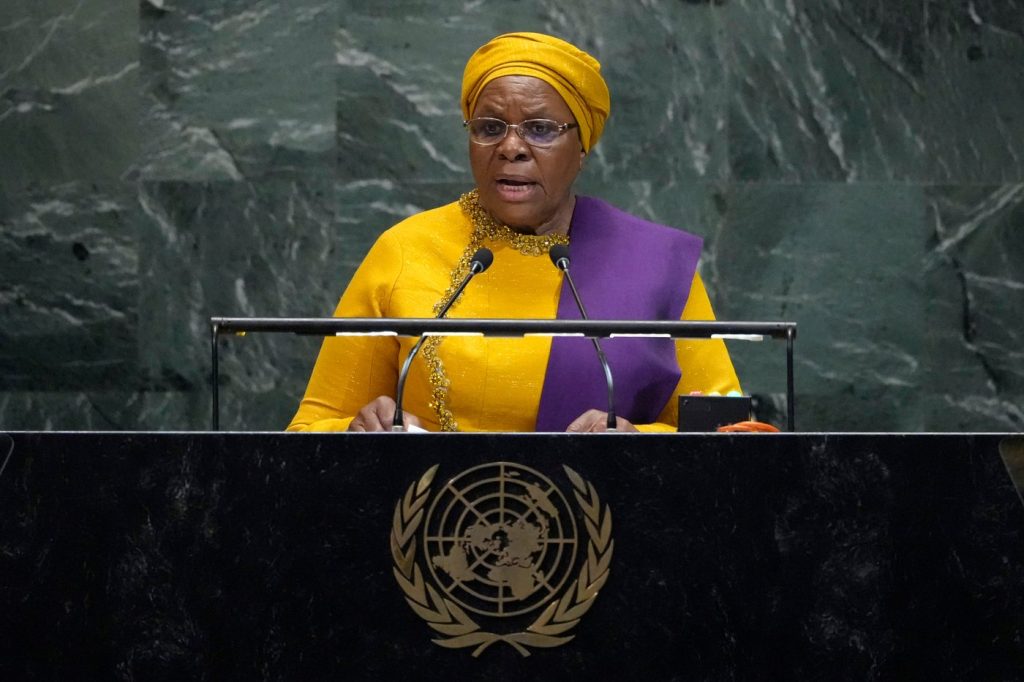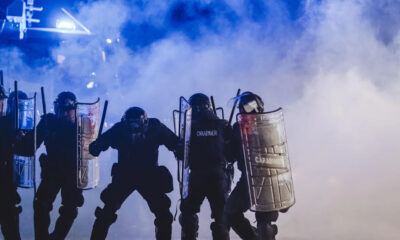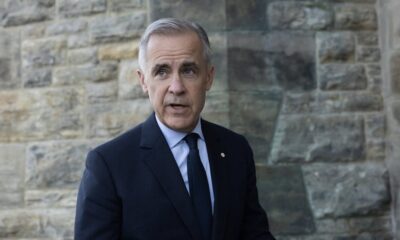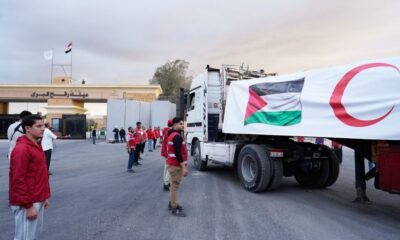World
African Leaders Focus on Global Issues While Home Conflicts Persist

African leaders addressed the United Nations General Assembly last week, prioritizing global issues over pressing conflicts within their own nations. During their speeches, leaders such as Kassim Shettima, the Vice President of Nigeria, and Bassirou Faye, the President of Senegal, emphasized urgent matters like climate change and global inequality. They voiced strong opposition to the ongoing violence in Gaza, with Shettima stating, “The people of Palestine are not collateral damage in a civilization that is searching for order.”
Despite their vigorous rhetoric on international concerns, analysts point out that critical issues in Africa, particularly conflicts in Sudan and the Democratic Republic of Congo, received little attention. Chris Ogunmodede, an analyst specializing in African affairs, noted that African leaders have increasingly shied away from placing homegrown issues at the forefront of international discussions. He remarked, “On the most important dates on the U.N. calendar, there is nothing to say about African issues in any substantive way.”
The conflict in Sudan has escalated into what the U.N. describes as the world’s largest humanitarian crisis since it erupted in mid-2023. This turmoil began when a paramilitary group launched an attack on the country’s armed forces, leading to a civil war that has claimed over 40,000 lives and divided the nation. The army has reasserted control over the capital, while the Rapid Support Forces have been pushed into the western region of Darfur. The U.N. has issued warnings about mass atrocities and ongoing famine, as both factions impose severe restrictions on food and aid.
In the Democratic Republic of Congo, conflict has also taken a devastating toll. Since the resurgence of the M23 rebel group in January, approximately 7,000 people have lost their lives, and millions have been displaced. The U.N. reports that over 100 rebel groups are currently active in the eastern region, further complicating the situation. Despite a peace initiative brokered in Doha, fighting persists, leading analysts like Beverly Ochieng to lament the missed opportunities for African leaders to highlight these humanitarian crises effectively.
The lack of focus on these internal conflicts during the U.N. speeches reflects a broader trend of disengagement from African leaders in addressing pressing regional issues. Ogunmodede emphasized the limitations of African institutions and their inability to effectively advocate for their interests on the global stage. “We are seeing the reality of the limitations of African institutions and states, the limitations of their own ability to pursue their own international affairs,” he stated.
Meanwhile, external powers continue to dominate the negotiations surrounding these conflicts. This week, diplomatic efforts led by the United States, the United Arab Emirates, Saudi Arabia, and Egypt have intensified in an attempt to resolve the war in Sudan. A peace agreement involving Congo and Rwanda is also expected to be finalized soon.
The geopolitical dynamics of both conflicts have become increasingly complex, drawing in neighboring countries and external actors. The U.N. has accused Rwanda of backing the M23 rebel group in Congo, complicating the resolution of the conflict. Additionally, Sudanese armed forces have lodged a complaint with the U.N. against the UAE, alleging it has been arming their adversaries, a claim the UAE has denied.
Ochieng noted that the influence of these external interests often overshadows the role of African institutions, which struggle to provide substantial incentives for peace and security initiatives. “The outside interests have leverage, and that compels armed actors to deal with peace mechanisms coming from outside,” she said.
As African leaders continue to engage in global discussions, the pressing need for a more robust focus on their own conflicts remains a significant concern. The humanitarian crises in Sudan and the Democratic Republic of Congo demand urgent attention, not only from their leaders but from the international community as well.
-

 World3 months ago
World3 months agoScientists Unearth Ancient Antarctic Ice to Unlock Climate Secrets
-

 Entertainment3 months ago
Entertainment3 months agoTrump and McCormick to Announce $70 Billion Energy Investments
-

 Science3 months ago
Science3 months agoFour Astronauts Return to Earth After International Space Station Mission
-

 Lifestyle3 months ago
Lifestyle3 months agoTransLink Launches Food Truck Program to Boost Revenue in Vancouver
-

 Technology2 months ago
Technology2 months agoApple Notes Enhances Functionality with Markdown Support in macOS 26
-

 Top Stories7 days ago
Top Stories7 days agoUrgent Update: Fatal Crash on Highway 99 Claims Life of Pitt Meadows Man
-

 Sports3 months ago
Sports3 months agoSearch Underway for Missing Hunter Amid Hokkaido Bear Emergency
-

 Politics2 months ago
Politics2 months agoUkrainian Tennis Star Elina Svitolina Faces Death Threats Online
-

 Technology3 months ago
Technology3 months agoFrosthaven Launches Early Access on July 31, 2025
-

 Politics3 months ago
Politics3 months agoCarney Engages First Nations Leaders at Development Law Summit
-

 Entertainment3 months ago
Entertainment3 months agoCalgary Theatre Troupe Revives Magic at Winnipeg Fringe Festival
-

 Politics1 week ago
Politics1 week agoShutdown Reflects Democratic Struggles Amid Economic Concerns



















